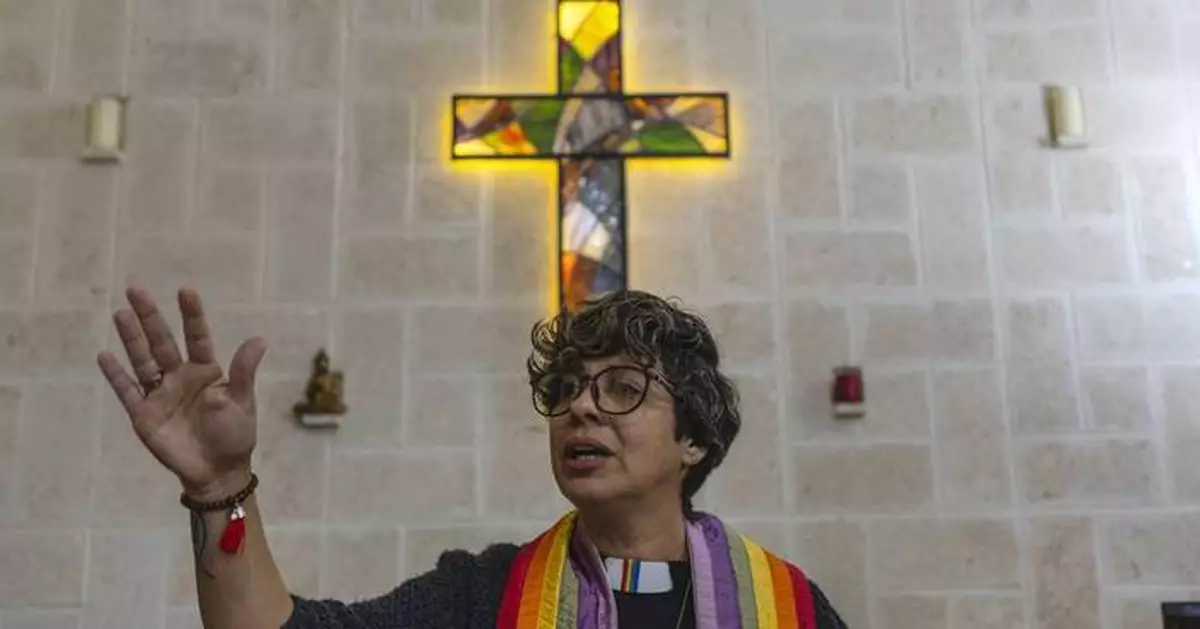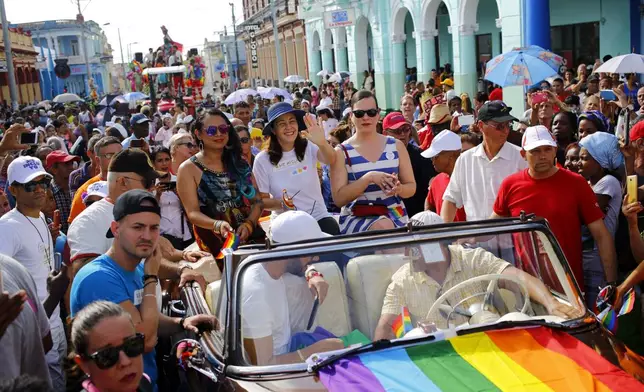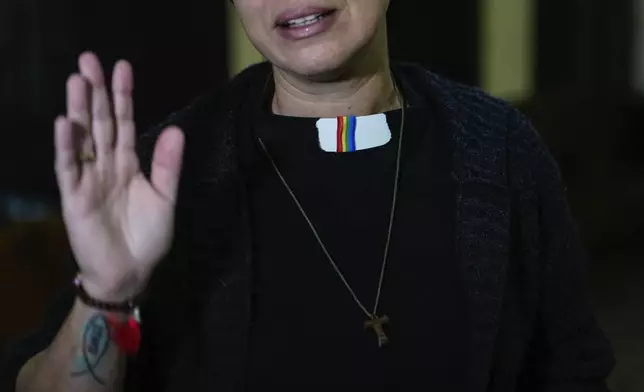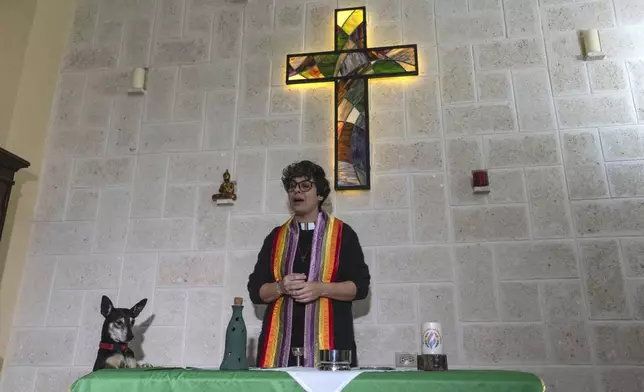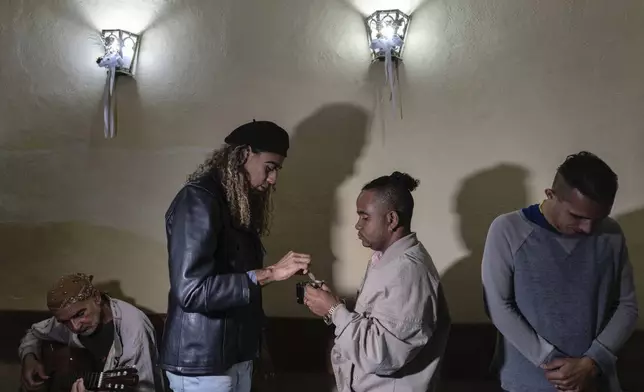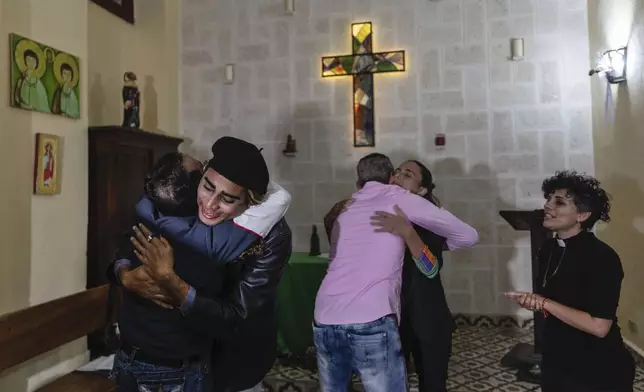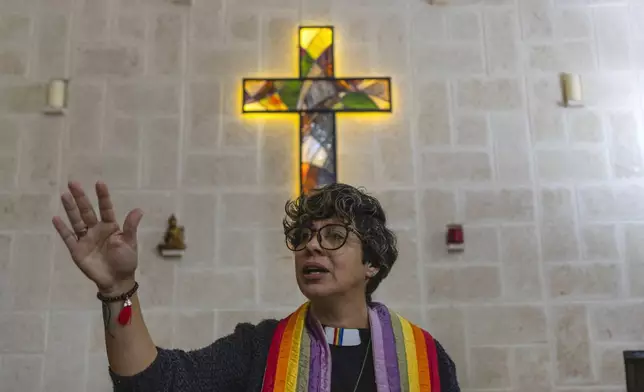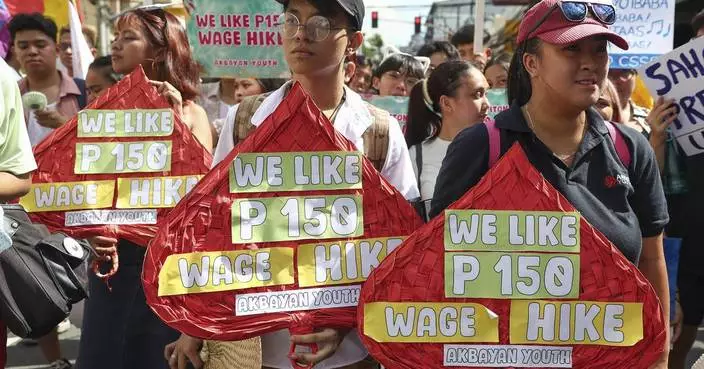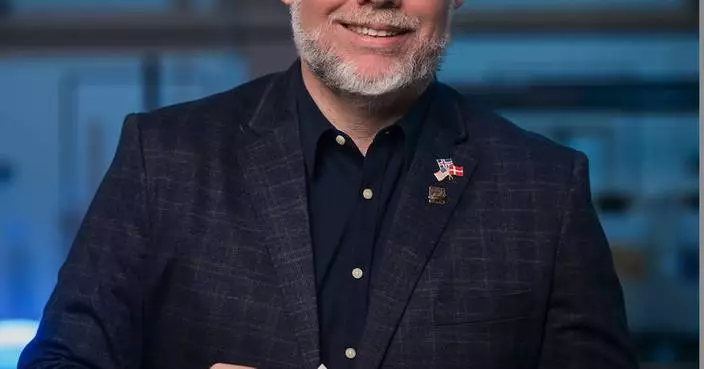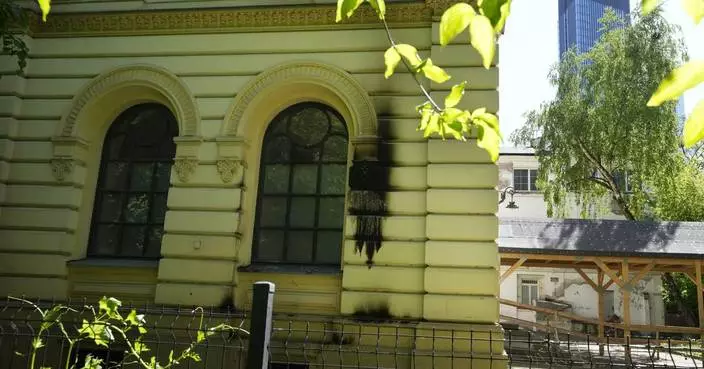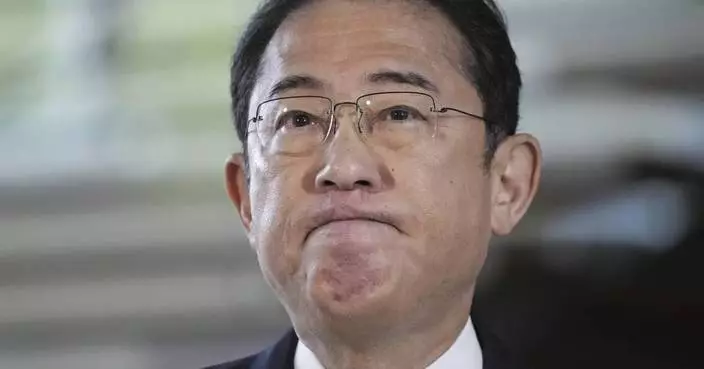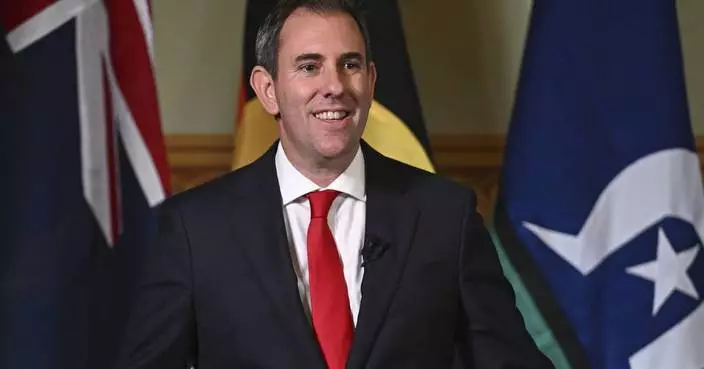MATANZAS, Cuba (AP) — Proudly wearing a rainbow-colored clergy stole and a rainbow flag in her clerical collar, the Rev. Elaine Saralegui welcomed all to her LGBTQ+ inclusive church in the Cuban port city of Matanzas.
“We’re all invited. And no one can exclude us,” Saralegui told same-sex couples who held hands sitting on wooden pews in the Metropolitan Community Church where she had recently married her wife.
Click to Gallery
Rev. Elaine Saralegui, wearing a rainbow flag on her clerical collar, talks at the end of a service at the Metropolitan Community Church, an LGBTQ+ inclusive house of worship, in Matanzas, Cuba, Friday, Feb. 2, 2024. “This church is a family,” said Saralegui, who has a tattoo of the Jesus fish on one of her forearms and wears a Buddhist bracelet. (AP Photo/Ramon Espinosa)
Rev. Elaine Saralegui, wearing a rainbow-colored clergy stole and her clerical collar, welcomes congregants to a service at the Metropolitan Community Church, an LGBTQ+ inclusive house of worship, as Ruth the dog stands with her front paws on the altar table, in Matanzas, Cuba, Friday, Feb. 2, 2024. In 2015, with support from the U.S.-based LGBTQ+ affirming Metropolitan Community Churches, they converted a house into their church, decked with wooden pews and a stained-glass cross that hangs above the altar. (AP Photo/Ramon Espinosa)
Mario Amilcar, center left, prepares to give Holy Communion to a fellow congregant during a service at the Metropolitan Community Church, an LGBTQ+ inclusive house of worship, in Matanzas, Cuba, Friday, Feb. 2, 2024. In recent years, the communist-run island barred anti-gay discrimination, and a 2022 government-backed “family law” allowed same-sex couples the right to marry and adopt. (AP Photo/Ramon Espinosa)
Rev. Elaine Saralegui, wearing a rainbow-colored clergy stole and her clerical collar, leads a service at the Metropolitan Community Church, an LGBTQ+ inclusive house of worship, in Matanzas, Cuba, Friday, Feb. 2, 2024. In recent years, the communist-run island barred anti-gay discrimination, and a 2022 government-backed “family law” — approved by popular vote — allowed same-sex couples the right to marry and adopt. (AP Photo/Ramon Espinosa) (AP Photo/Ramon Espinosa)
MATANZAS, Cuba (AP) — Proudly wearing a rainbow-colored clergy stole and a rainbow flag in her clerical collar, the Rev. Elaine Saralegui welcomed all to her LGBTQ+ inclusive church in the Cuban port city of Matanzas.
Rev. Elaine Saralegui, wearing a rainbow flag on her clerical collar, talks at the end of a service at the Metropolitan Community Church, an LGBTQ+ inclusive house of worship, in Matanzas, Cuba, Friday, Feb. 2, 2024. “This church is a family,” said Saralegui, who has a tattoo of the Jesus fish on one of her forearms and wears a Buddhist bracelet. (AP Photo/Ramon Espinosa)
Rev. Elaine Saralegui, wearing a rainbow-colored clergy stole and her clerical collar, welcomes congregants to a service at the Metropolitan Community Church, an LGBTQ+ inclusive house of worship, as Ruth the dog stands with her front paws on the altar table, in Matanzas, Cuba, Friday, Feb. 2, 2024. In 2015, with support from the U.S.-based LGBTQ+ affirming Metropolitan Community Churches, they converted a house into their church, decked with wooden pews and a stained-glass cross that hangs above the altar. (AP Photo/Ramon Espinosa)
Mario Amilcar, center left, prepares to give Holy Communion to a fellow congregant during a service at the Metropolitan Community Church, an LGBTQ+ inclusive house of worship, in Matanzas, Cuba, Friday, Feb. 2, 2024. In recent years, the communist-run island barred anti-gay discrimination, and a 2022 government-backed “family law” allowed same-sex couples the right to marry and adopt. (AP Photo/Ramon Espinosa)
Rev. Yileyvis Cruz stands by as congregants embrace during a service at the Metropolitan Community Church, an LGBTQ+ inclusive house of worship, in Matanzas, Cuba, Friday, Feb. 2, 2024. In recent years, the communist-run island barred anti-gay discrimination, and a 2022 government-backed “family law” allowed same-sex couples the right to marry and adopt. (AP Photo/Ramon Espinosa)
Posters featuring church members with a message that reads in Spanish: "Christ loves my colors", are displayed on a wall at the Metropolitan Community Church, an LGBTQ+ inclusive house of worship, in Matanzas, Cuba, Friday, Feb. 2, 2024. Members of Cuba’s LGBTQ+ community say a 2022 government-backed “family law” that allows same-sex couples the right to marry and adopt marked a milestone. (AP Photo/Ramon Espinosa)
Same-sex couples stand in prayer with outstretched hands inside the Metropolitan Community Church, an LGBTQ+ inclusive house of worship, in Matanzas, Cuba, Friday, Feb. 2, 2024. Cuba repressed gay people after its 1959 revolution led by Fidel Castro and sent many to labor camps. (AP Photo/Ramon Espinosa)
Rev. Elaine Saralegui, wearing a rainbow-colored clergy stole and her clerical collar, leads a service at the Metropolitan Community Church, an LGBTQ+ inclusive house of worship, in Matanzas, Cuba, Friday, Feb. 2, 2024. In recent years, the communist-run island barred anti-gay discrimination, and a 2022 government-backed “family law” — approved by popular vote — allowed same-sex couples the right to marry and adopt. (AP Photo/Ramon Espinosa) (AP Photo/Ramon Espinosa)
These words and this kind of gathering would have been unimaginable before in the largest country in the conservative and mostly Christian Caribbean, where anti-gay hostility is still widespread.
Cuba repressed gay people after its 1959 revolution led by Fidel Castro and sent many to labor camps. But in recent years, the communist-run island barred anti-gay discrimination, and a 2022 government-backed “family law” — approved by popular vote — allowed same-sex couples the right to marry and adopt.
Members of Cuba’s LGBTQ+ community say it marked a milestone that has allowed them to embrace their gender identity and worship more freely in a country that for decades after the revolution was officially atheist. Over the past quarter century, it has gradually become more tolerant of religions.
“It’s huge. There aren't enough words to say what an opportunity it is to achieve the dream of so many,” said Maikol Añorga. He was with his husband, Vladimir Marin, near the altar, where at a Friday service they joined other congregants taking turns to lay offerings of white and pink wildflowers to thank God.
“It’s the opportunity for all people to be present here,” he said, “to gather and participate without regards to their gender, race or religion.”
The Catholic Church, in its doctrine, still rejects same-sex marriage and condemns any sexual relations between gay or lesbian partners as “intrinsically disordered.” Yet Pope Francis has done far more than any previous pope to make the church a more welcoming place for LGBTQ+ people.
In December, the pope formally approved letting Catholic priests bless same-sex couples, a policy shift that aimed at making the church more inclusive while maintaining its strict ban on gay marriage.
The family law in Cuba faced opposition from the country's Catholic church as well as the growing number of evangelical churches that have mushroomed across the island.
Anti-LGBTQ+ rights demonstrations have faded since 2022. But back then, evangelical pastors spoke out from the pulpit, and handed out Bibles and pamphlets in the streets invoking God’s “original plan” for unions between men and women and calling gay relationships a sin.
Still, the measure was overwhelmingly approved by nearly 67% of voters. It came after a huge government campaign of nationwide informative meetings and extensive state media coverage amid food shortages and blackouts that have prompted thousands to immigrate to the United States during one of one of the worst economic crises to hit Cuba in decades.
At the time, President Miguel Díaz-Canel told Cubans in a video message that he was pleased about the wide support that the measure received despite tough economic challenges. He celebrated, tweeting: “Love is now the law.”
For years, the movement for LGBTQ+ rights has been proudly led by Cuba’s best-known advocate for gay rights: Mariela Castro, daughter of former President Raul Castro and niece of his brother Fidel.
“This just brings happiness. This just makes people feel truly worthy, respected, loved, considered – a true citizen with their rights and duties,” Castro told The Associated Press.
"I think we’ve taken a very valuable step forward.”
Long before same-sex couples were granted the right to marry, Castro was advocating for it, while training police on relations with the LGBTQ+ community and sponsoring symbolical ceremonies where Protestant clergy from the U.S. and Canada blessed unions as part of the annual Pride parade.
“It was a beautiful spiritual experience for me, and I believe for those people as well,” said Castro, who heads Cuba’s National Center for Sex Education and is a member of the National Assembly. “First, our campaign was: ‘Let love be the law.’ Now, love is the law, and we’re going to keep celebrating it.”
In 2010, her uncle, then- retired leader Fidel Castro admitted that he was wrong to discriminate against gay people. Asked about this, she said it helped mark a turning point in public attitude.
“I think he was honest. It was good and healthy for him to say this because it helped the rest who were still clinging to prejudices to understand that this kind of thought can change,” she said.
“Even in a revolutionary leader like him, there were prejudices that evolved, and he was able to understand it and help clear the way for change.”
In the early years after the 1959 revolution, homophobia in Cuba, she said, was no different than in the rest of the world. In the United States, homosexuality was deemed a mental disorder by psychiatric authorities, and gay sex was a crime in most states. Currently, Russia — a major supporter of Fidel Castro when it was the core of the communist Soviet Union — is bucking the worldwide trend of greater LGBTQ+ acceptance with a multi-pronged crackdown on LGBTQ+ activism.
The previous Cuban Family Code, dating back to 1975, stipulated that marriage was between a man and a woman – not between two people – which excluded lifelong partners from inheritance rights.
The new law goes further than marriage equality – which activists tried to include in the Constitution in 2019 without success – or the ability for gay couples to adopt or use surrogates. It also expanded rights for children, the elderly and women.
The first members of Saralegui’s congregation began gathering on a house terrace in Matanzas over a decade ago to sing and pray.
“The sky was our ceiling and when it rained, we’d all pack into a small room,” Saralegui said. In 2015, with support from the U.S.-based LGBTQ+ affirming Metropolitan Community Churches, they converted a house into their church, decked with wooden pews and a stained-glass cross that hangs above the altar. Underneath, a local Tibetan Buddhist group that meets here during the week stores its musical instruments in an example of interfaith partnership.
“This church is a family,” said Saralegui, who has a tattoo of the Jesus fish on one of her forearms and wears a Buddhist bracelet. “It’s a sacred space, not just because there’s a cross or an altar, but because it’s the most sacred space for these people to come to — it's where they come to have a safe space.”
After receiving Communion, congregant Nico Salazar, 18, said he was glad to have found that safe space here after members of an evangelical church where he grew up attending asked him not to return when he embraced his gender identity.
“It’s the essence of the Bible: God is love, and other churches should emphasize that instead of repressing and harming others with a supposed sin,” said Salazar, who was born a woman and this year started hormone treatment.
“Sin and love are not the same,” said Salazar, who wore an earring in the shape of a cross.
“And to love," he added, "is not a sin.”
__
Associated Press religion coverage receives support through the AP’s collaboration with The Conversation US, with funding from Lilly Endowment Inc. The AP is solely responsible for this content.

FILE - Mariela Castro, director of Cuba's National Center for Sexual Education, waves from a convertible classic car during a parade marking the International Day Against Homophobia, Transphobia and Biphobia, in Pinar Del Rio, Cuba, May 17, 2018. For years, the movement for LGBTQ+ rights has been proudly led by Cuba’s best-known advocate for gay rights: Mariela Castro, daughter of former President Raul Castro and niece of his brother Fidel. (AP Photo/Desmond Boylan, File)

Rev. Elaine Saralegui, wearing a rainbow flag on her clerical collar, talks at the end of a service at the Metropolitan Community Church, an LGBTQ+ inclusive house of worship, in Matanzas, Cuba, Friday, Feb. 2, 2024. “This church is a family,” said Saralegui, who has a tattoo of the Jesus fish on one of her forearms and wears a Buddhist bracelet. (AP Photo/Ramon Espinosa)

Rev. Elaine Saralegui, wearing a rainbow-colored clergy stole and her clerical collar, welcomes congregants to a service at the Metropolitan Community Church, an LGBTQ+ inclusive house of worship, as Ruth the dog stands with her front paws on the altar table, in Matanzas, Cuba, Friday, Feb. 2, 2024. In 2015, with support from the U.S.-based LGBTQ+ affirming Metropolitan Community Churches, they converted a house into their church, decked with wooden pews and a stained-glass cross that hangs above the altar. (AP Photo/Ramon Espinosa)

Mario Amilcar, center left, prepares to give Holy Communion to a fellow congregant during a service at the Metropolitan Community Church, an LGBTQ+ inclusive house of worship, in Matanzas, Cuba, Friday, Feb. 2, 2024. In recent years, the communist-run island barred anti-gay discrimination, and a 2022 government-backed “family law” allowed same-sex couples the right to marry and adopt. (AP Photo/Ramon Espinosa)

Rev. Yileyvis Cruz stands by as congregants embrace during a service at the Metropolitan Community Church, an LGBTQ+ inclusive house of worship, in Matanzas, Cuba, Friday, Feb. 2, 2024. In recent years, the communist-run island barred anti-gay discrimination, and a 2022 government-backed “family law” allowed same-sex couples the right to marry and adopt. (AP Photo/Ramon Espinosa)
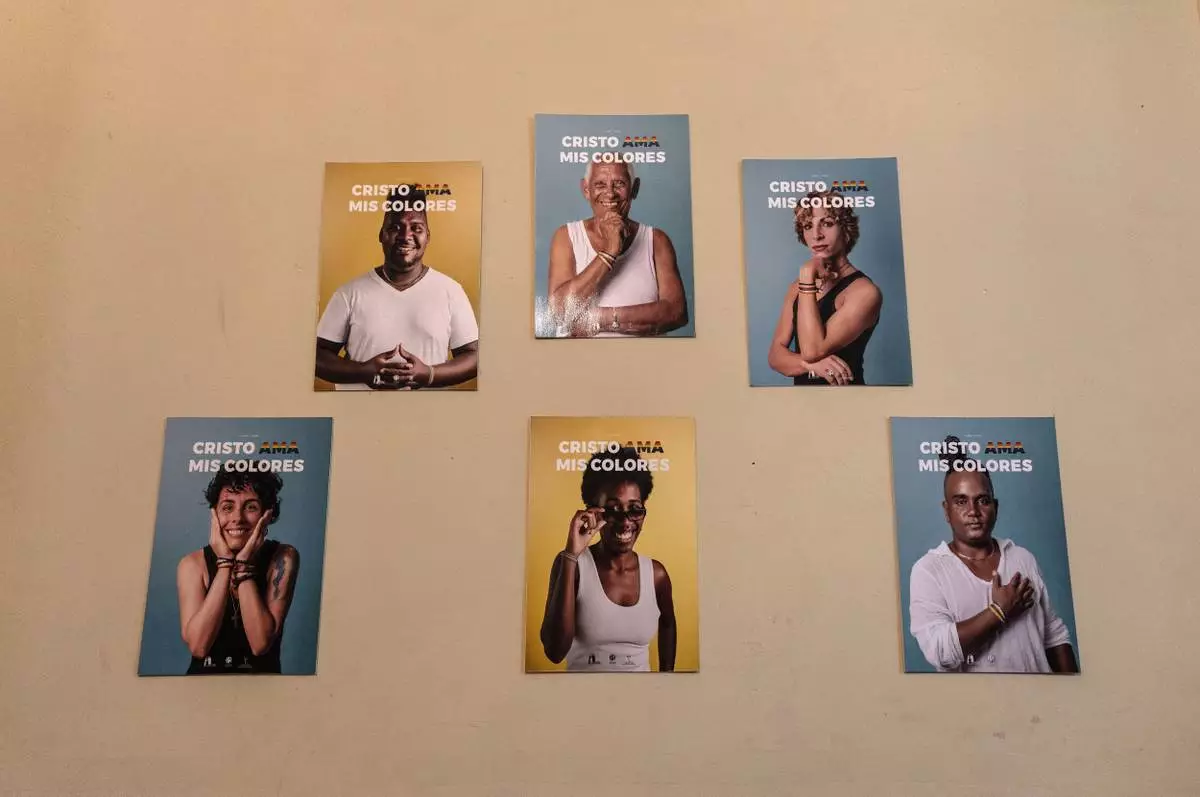
Posters featuring church members with a message that reads in Spanish: "Christ loves my colors", are displayed on a wall at the Metropolitan Community Church, an LGBTQ+ inclusive house of worship, in Matanzas, Cuba, Friday, Feb. 2, 2024. Members of Cuba’s LGBTQ+ community say a 2022 government-backed “family law” that allows same-sex couples the right to marry and adopt marked a milestone. (AP Photo/Ramon Espinosa)
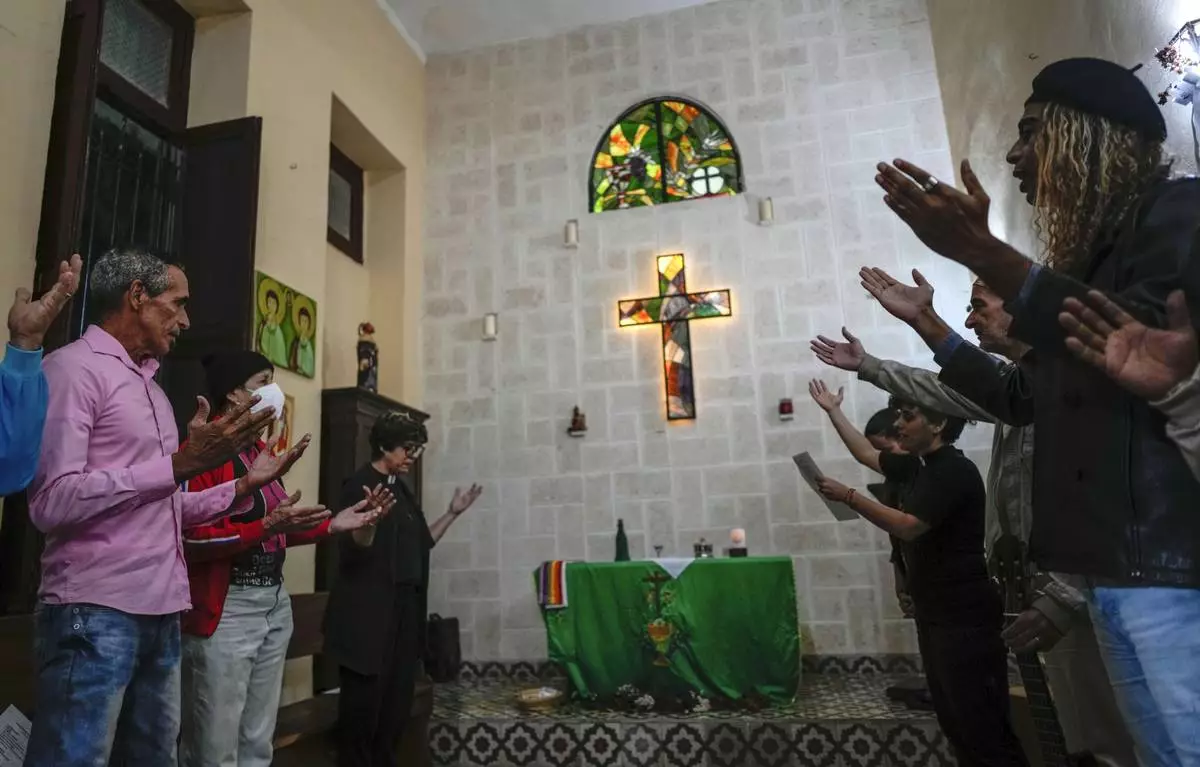
Same-sex couples stand in prayer with outstretched hands inside the Metropolitan Community Church, an LGBTQ+ inclusive house of worship, in Matanzas, Cuba, Friday, Feb. 2, 2024. Cuba repressed gay people after its 1959 revolution led by Fidel Castro and sent many to labor camps. (AP Photo/Ramon Espinosa)

Rev. Elaine Saralegui, wearing a rainbow-colored clergy stole and her clerical collar, leads a service at the Metropolitan Community Church, an LGBTQ+ inclusive house of worship, in Matanzas, Cuba, Friday, Feb. 2, 2024. In recent years, the communist-run island barred anti-gay discrimination, and a 2022 government-backed “family law” — approved by popular vote — allowed same-sex couples the right to marry and adopt. (AP Photo/Ramon Espinosa) (AP Photo/Ramon Espinosa)
CHARLOTTE, N.C. (AP) — United Methodist delegates repealed their church’s longstanding ban on LGBTQ clergy with no debate on Wednesday, removing a rule forbidding “self-avowed practicing homosexuals” from being ordained or appointed as ministers.
Delegates voted 692-51 at their General Conference — the first such legislative gathering in five years. That overwhelming margin contrasts sharply with the decades of controversy around the issue. Past General Conferences of the United Methodist Church had steadily reinforced the ban and related penalties amid debate and protests, but many of the conservatives who had previously upheld the ban have left the denomination in recent years, and this General Conference has moved in a solidly progressive direction.
Applause broke out in parts of the convention hall Wednesday after the vote. A group of observers from LGBTQ advocacy groups embraced, some in tears. “Thanks be to God,” said one.
The change doesn’t mandate or even explicitly affirm LGBTQ clergy, but it means the church no longer forbids them. It’s possible that the change will mainly apply to U.S. churches, since United Methodist bodies in other countries, such as in Africa, have the right to impose the rules for their own regions. The measure takes effect immediately upon the conclusion of General Conference, scheduled for Friday.
The consensus was so overwhelmingly that it was rolled into a “consent calendar,” a package of normally non-controversial measures that are bundled into a single vote to save time.
Also approved was a measure that forbids district superintendents — a regional administrator — from penalizing clergy for either performing a same-sex wedding or for refraining from performing one. It also forbids superintendents from forbidding or requiring a church from hosting a same-sex wedding.
That measure further removes scaffolding around the various LGBTQ bans that have been embedded various parts of official church law and policy. On Tuesday, delegates had begun taking steps to dismantle such policies.
Delegates are also expected to vote as soon as today on whether to replace their existing official Social Principles with a new document that no longer calls the “practice of homosexuality … incompatible with Christian teaching” and that now defines marriage as between “two people of faith” rather than between a man and a woman.
The changes are historic in a denomination that has debated LGBTQ issues for more than half a century at its General Conferences, which typically meet every four years. On Tuesday, delegates voted to remove mandatory penalties for conducting same-sex marriages and to remove their denomination’s bans on considering LGBTQ candidates for ministry and on funding for gay-friendly ministries.
About 100 LGBTQ people and allies gathered outside the Charlotte Convention Center after the vote — many with rainbow-colored scarves and umbrellas — to celebrate, pray and sing praise songs accompanied by a drum.
Bishop Karen Oliveto, the first openly lesbian bishop in the United Methodist Church, was among those celebrating.
“It seemed like such a simple vote, but it carried so much weight and power, as 50 years of restricting the Holy Spirit’s call on people’s lives has been lifted,” said Oliveto, of the Mountain Sky Episcopal Area, which includes Colorado, Montana, Utah and Wyoming. “People can live fully into their call without fear. The church we’ve loved has found a home for us.”
Angie Cox, an observer at the meeting from Ohio, said she has gone before her conference’s board of ordained ministry six times but was “told no just because of the prohibition on LGBTQ clergy.” She said Wednesday’s vote “means I might be able finally to live fully into my calling.”
Tracy Merrick, a delegate from Pittsburgh who has advocated for LGBTQ inclusion at several previous conferences, said with emotion that there were “many times when I thought we would never see this day.”
The vote, he said, enables the church to become “the denomination that many of us had envisioned for years.”
At the same time, the vote comes following the departure of one-quarter of the U.S. churches within the UMC. And it could also prompt departures of some international churches, particularly in Africa, where more conservative sexual values prevail and where same-sex activity is criminalized in some countries.
Last week, the conference endorsed a regionalization plan that essentially would allow the churches of the United States the same autonomy as other regions of the global church. That change — which still requires local ratification — could create a scenario where LGBTQ clergy and same-sex marriage are allowed in the United States but not in other regions.
More than 7,600 mostly conservative congregations in the United States disaffiliated between 2019 and 2023 reflecting dismay over the denomination not enforcing its bans on same-sex marriage and LGBTQ ordination.
The conference last week also approved the departure of a small group of conservative churches in the former Soviet Union.
The church's 1972 General Conference approved a statement in its non-binding Social Principles that homosexuality is “incompatible with Christian teaching" — a phrase omitted in a revision to the Social Principles that is also headed for a conference vote this week.
The now-repealed ban on clergy who are "self-avowed practicing homosexuals" was originally enacted in 1984, when the conference also voted to require “fidelity in marriage and celibacy in singleness.”
The denomination had until recently been the third largest in the United States, present in almost every county. But its 5.4 million U.S. membership in 2022 is expected to drop once the 2023 departures are factored in.
The denomination also counts 4.6 million members in other countries, mainly in Africa, though earlier estimates have been higher.
Associated Press religion coverage receives support through the AP’s collaboration with The Conversation US, with funding from Lilly Endowment Inc. The AP is solely responsible for this content.
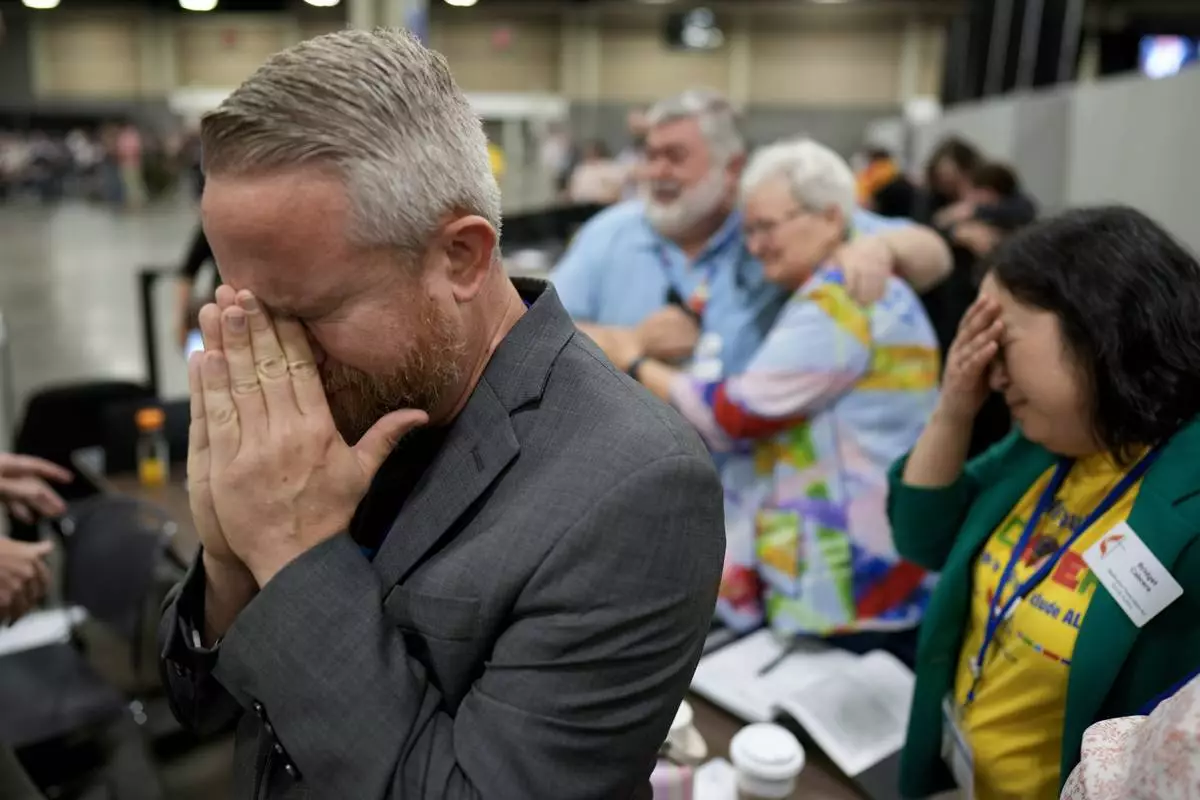
CORRECTS ID: Rev. Andy Oliver, Pastor of Allendale UMC in St. Petersburg, Florida, reacts after an approval vote at the United Methodist Church General Conference Wednesday, May 1, 2024, in Charlotte, N.C. United Methodist delegates repealed their church’s longstanding ban on LGBTQ clergy with no debate on Wednesday, removing a rule forbidding “self-avowed practicing homosexuals” from being ordained or appointed as ministers. (AP Photo/Chris Carlson)

CORRECTS ID: Rev. Andy Oliver, Pastor of Allendale UMC in St. Petersburg, Florida, left, and David Meredith wipe away tears after an approval vote at the United Methodist Church General Conference Wednesday, May 1, 2024, in Charlotte, N.C. United Methodist delegates repealed their church’s longstanding ban on LGBTQ clergy with no debate on Wednesday, removing a rule forbidding “self-avowed practicing homosexuals” from being ordained or appointed as ministers. (AP Photo/Chris Carlson)

A convention goer wears a button supporting LGBTQ clergy at the United Methodist Church General Conference Wednesday, May 1, 2024, in Charlotte, N.C. United Methodist delegates repealed their church’s longstanding ban on LGBTQ clergy with no debate on Wednesday, removing a rule forbidding “self-avowed practicing homosexuals” from being ordained or appointed as ministers. (AP Photo/Chris Carlson)

David Meredith, left, and Jan Lawrence react after an approval vote at the United Methodist Church General Conference Wednesday, May 1, 2024, in Charlotte, N.C. United Methodist delegates repealed their church’s longstanding ban on LGBTQ clergy with no debate on Wednesday, removing a rule forbidding “self-avowed practicing homosexuals” from being ordained or appointed as ministers. (AP Photo/Chris Carlson)
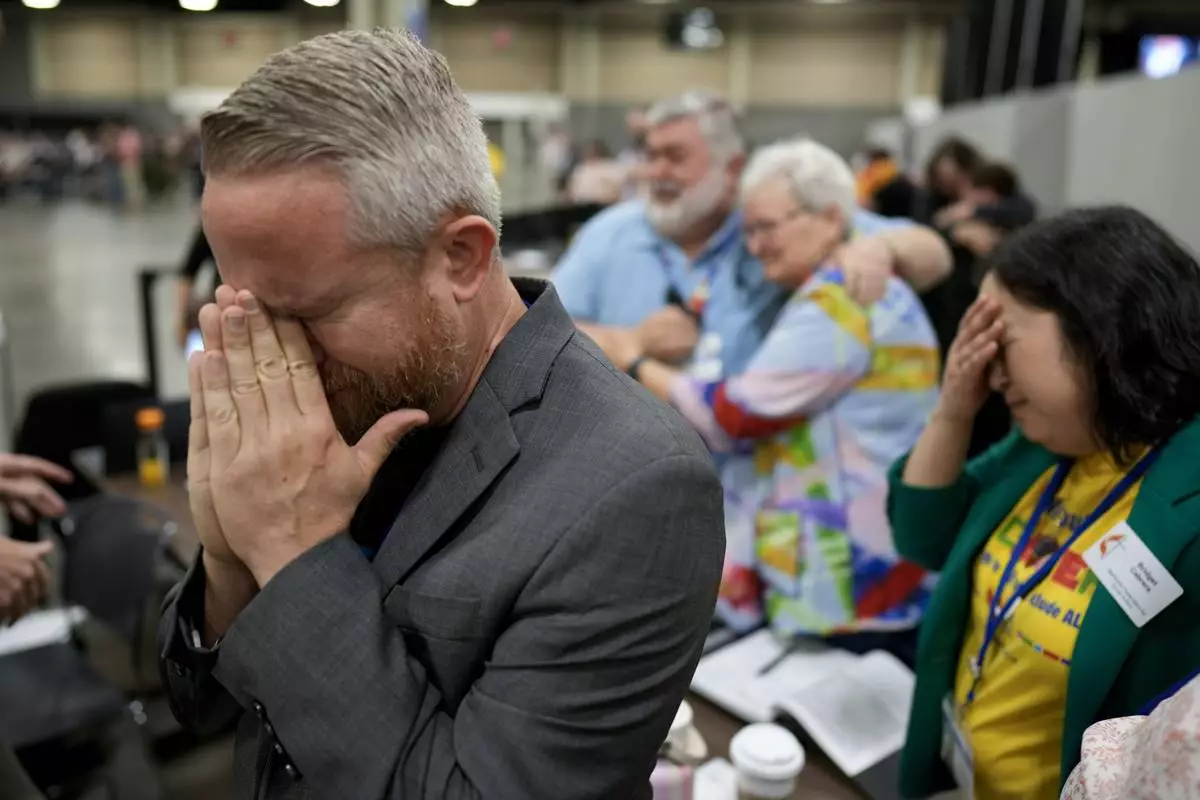
David Oliver reacts after an approval vote at the United Methodist Church General Conference Wednesday, May 1, 2024, in Charlotte, N.C. United Methodist delegates repealed their church’s longstanding ban on LGBTQ clergy with no debate on Wednesday, removing a rule forbidding “self-avowed practicing homosexuals” from being ordained or appointed as ministers. (AP Photo/Chris Carlson)

David Meredith, middle, hugs fellow observers after an approval vote at the United Methodist Church General Conference Wednesday, May 1, 2024, in Charlotte, N.C. United Methodist delegates repealed their church’s longstanding ban on LGBTQ clergy with no debate on Wednesday, removing a rule forbidding “self-avowed practicing homosexuals” from being ordained or appointed as ministers. (AP Photo/Chris Carlson)

Angie Cox, left, and Joelle Henneman hug after an approval vote at the United Methodist Church General Conference Wednesday, May 1, 2024, in Charlotte, N.C. United Methodist delegates repealed their church’s longstanding ban on LGBTQ clergy with no debate on Wednesday, removing a rule forbidding “self-avowed practicing homosexuals” from being ordained or appointed as ministers.(AP Photo/Chris Carlson)

David Oliver, left, and David Meredith wipe away tears after an approval vote at the United Methodist Church General Conference Wednesday, May 1, 2024, in Charlotte, N.C. United Methodist delegates repealed their church’s longstanding ban on LGBTQ clergy with no debate on Wednesday, removing a rule forbidding “self-avowed practicing homosexuals” from being ordained or appointed as ministers. (AP Photo/Chris Carlson)

Michigan Bishop David Bard presides at a session of the General Conference of the United Methodist Church on Tuesday, April 30, 2024, in Charlotte, N.C. (AP Photo/Peter Smith)

United Methodist delegates listen to a debate during their General Conference meeting Tuesday, April 30, 2024, in Charlotte, N.C. (AP Photo/Peter Smith)










